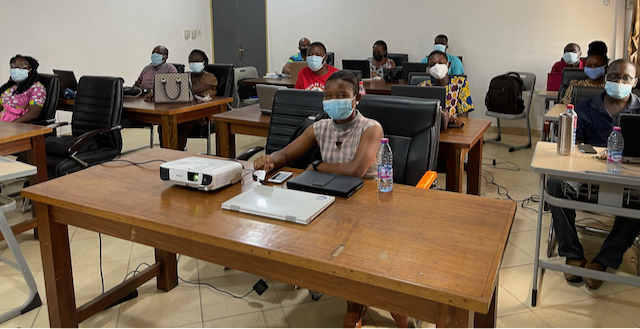By Dr. Outule Rapuleng, Head of ARIPO Academy
The ARIPO Academy strives to become the Centre of Excellence for all Intellectual Property (IP) training programs in Africa. This is in view of its mandate to promote the development of the intellectual property system in Africa by developing human capital in the field of IP, capacity building courses and materials on intellectual property.
The Academy offers a wide range of programs that include general IP courses, academic programs, IP awareness programs, tailor-made courses, and supporting the development of IP Policies for institutions. The academic programs offered are in partnership with the World Intellectual Property Organization (WIPO), Africa University in Mutare, Zimbabwe, Kwame Nkrumah University of Science and Technology (KNUST) in Kumasi, Ghana, and with the University of Dar es Salaam (UDSM) in Tanzania.
MIP Programme at Kwame Nkrumah University of Science and Technology (KNUST)
This year, ARIPO continued to share knowledge by teaching the MIP classes. KNUST reopened following a 9-month hiatus after been thrown out of kilter by the global Covid-19 pandemic. The University was closed on March 16, 2020, and reopened almost a year later, on January 16, 2021. On the other hand, UDSM reopened to accept the MIP class in residence at the Mikocheni Campus in November 2020 after closing for regular recess.
Timetabling by the respective Universities saw the Head of the ARIPO Academy, Dr. Outule Rapuleng, scheduled to teach two modules on IP Policy-Making and International Intellectual Property Rights System, during the third week of January. An additional remedial module on Collective Management Organizations (CMOs) and Cultural/Creative Industries was taught as students cited lacking depth in those particular copyright areas. At around the same time in the first week of February, the then Intellectual Property Development Executive at ARIPO, Mr Emmanuel Sackey, lectured at KNUST. He taught a module on Introduction to Intellectual Property to the just admitted KNUST group constituting 3rd cohort.
The second week of February, Mr. Sackey’s focus panned from West to East Africa. He delivered the modules on Biotechnology and Traditional Knowledge to the UDSM students, while Dr. Rapuleng delivered the International Intellectual Property System and Institutions module to the KNUST students. Additional modules were also delivered by Mr Said Ramadhan, Senior Patent Examiner (Biotechnology) at ARIPO. He taught the module on Industrial Property (Patents, Utility Models, Innovation and Industrial Designs) to the KNUST group. This was the last module in the first semester to be delivered by ARIPO. Subsequently, KNUST lecturers then take the baton. Additionally, other experts in the area are routinely co-opted to augment the program and ensure the highest quality instruction.
MIP Programme at the University of Dar es Salaam (UDSM)
At UDSM, the residential phase typically spans four months between November and March. This is preceded by the distance learning (DL) phase, which WIPO facilitates and it is administered over six weeks requiring 50 hours of study time. The current 2nd cohort will sit their examinations in the 2nd week of March 2021. This will mark the residential phase’s conclusion, at which point the students will return to their respective countries to embark on the research phase. The cohort has 12 students from Botswana, Kenya, and Malawi, while the rest are local students.
To a remarkable degree, the program at Kumasi is slightly different, as it is also longer. Indicative of its MPhil status, the KNUST program is a 2-year program. The residential phase takes a whole year. The ARIPO support in the program comes at the beginning of the program to set the tone. The DL component is not necessary in this regard. WIPO’s support is only in the form of study materials, specifically the WIPO treaties. After the residential year, the students return to their respective countries to begin another intensive research year. Like its sister program in the East, the Ghana program also has 12 students, mainly Ghanaians. The International students are from Malawi, Namibia, Uganda, Tanzania, and Zambia.
While ARIPO’s participation in teaching is its part contribution in the partnership with the Universities, ARIPO also views it through the prism of raising awareness and enhancing organizational visibility. From the students’ perspective, it presents an opportunity to hear from experts in IP practice and administration. The students also get to have more insights into the organization as its potential champions and brand ambassadors.
Future of learning amidst Covid-19
With the spectre of Covid-19 ever looming large, the ARIPO mission’s success could not be over-emphasized. All bets are still off due to the intractable nature of the pandemic. At stake, at all times, is the students’ safety and wellness, which calls for more nuanced approaches and risk-adjusted strategies in determining whether the lessons could proceed or not, let alone sending the students to the institutions. As the current situation lacks historical context, advice from the World Health Organization and national health authorities in the respective countries informed and will continue to inform the varied and diverse responses.
The pandemic also presented a silver lining. It accelerated the adoption of technology and ensured that the oft-distant 4th Industrial Revolution became a live reality in 2020. As continuity became imperative in the teaching and learning space, learners interacted directly with the content presented in multiple formats, mainly web-based. Learning no longer became sequenced and directed by the omnipresent teacher. It took place using a variety of synchronous and asynchronous activities. This was the stark reality with the MIP classes as some of them received their lectures via Zoom and other new age media. Such new learning environments also allowed for the learning of new social skills and collaboration. There is no telling how curriculum and instruction will be affected from now going forward.

